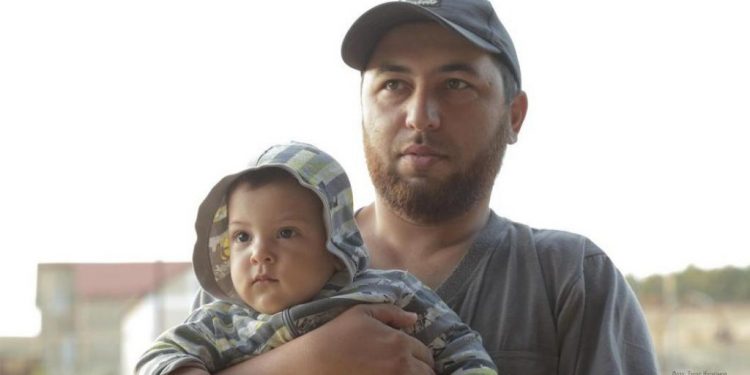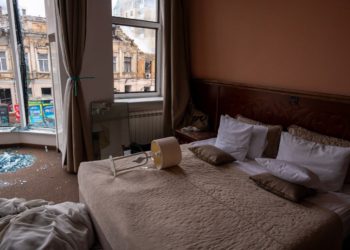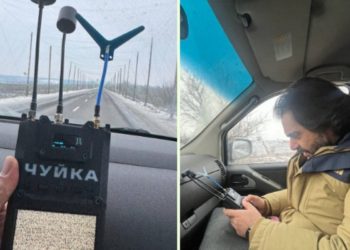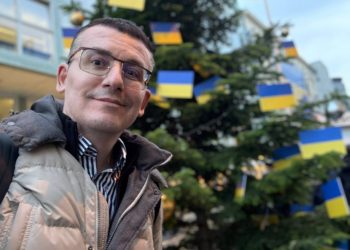Francis Fukuyama, an American philosopher, political economist, and publicist of Japanese origin, wrote a letter to Osman Arifmemetov, a citizen journalist arrested in the “case of Crimean Muslims.” According to the ZMINA center for human rights, in his letter to Arifmemetov, The End of History and the Last Man author writes that Crimea became a victim of Russian revanchism and territorial aggression.
“Russia is afraid of a democratic Ukraine: If Ukraine succeeds in its transition to liberal democracy, it will undercut Russian narratives about Ukraine and the greater region. The situation in Crimea has been an integral part of that fight. Journalists like yourself have been essential in preserving truth as Russia continues to cloud the media sphere with disinformation… You were one of the first citizen journalists to bring this situation to light in 2015. Because of your courageous reporting, we know of the detention and imprisonment of Belyal Adilov and Timur Ibrahimov, two of your fellow journalists, and it is shameful that the security services have imprisoned you in a similar manner…,” wrote the philosopher.
ZMINA and PEN Ukraine launched the human rights program #Solidarity words, within which 13 well-known Ukrainian writers and journalists became personal ambassadors of Crimean journalists imprisoned in temporarily occupied Crimea and Russia. The Prosecutor’s Office of the Autonomous Republic of Crimea, together with the Ukrainian Helsinki Human Rights Union, sent a message reflecting the facts of the persecution of journalists in the territory of Crimea to the Office of the Prosecutor of the International Criminal Court.
The Ministry of Foreign Affairs of Ukraine said: “Osman Arifmemetov, Ruslan Suleymanov, and Rustem Sheyhaliev were sentenced to 14 years in a high-security prison… Thus, the total sentence of all Crimean political prisoners is approaching 1,300 years.” In March 2019, citizen journalists were illegally detained on trumped-up charges of organizing and participating in the alleged activities of a terrorist organization and preparing for a violent seizure of power. “All these years, they have been under severe pressure from the judicial system of the Russian Federation, the methods of which are torture and psychological pressure. Their imprisonment became a traditional revenge for the pro-Ukrainian position and opposition to the Russian occupation of Crimea. These shameful verdicts are a demonstration of force where there is none, and yet another display of contempt for basic human rights,” Ukrainian diplomats emphasize.
Osman Arifmemetov was born in Uzbekistan on August 28, 1985. Uzbekistan was where the Crimean Tatar people were forcibly deported by the Soviet regime in 1944. When Osman was five, the family returned to Crimea and settled in Bakhchysarai. He studied at the Dolyna Secondary School of the Bakhchysarai District.
After school, Osman entered the Department of Mathematics at Tavriiskyi National University named after Vernadskyi. From 2011 to 2014, he worked as a programmer. Since 2015, he worked as a mathematics tutor, engaged in programming for children, taught children programming languages, and planned to create a children’s Internet project together with them.
At the university, he met Remzi Bekirov and Ruslan Suleymanov. All three became good friends and neighbors in the village of Strohanivka. They studied together, built together, became activists of Crimean Solidarity, and got involved in Case 25.
Osman is one of the first citizen journalists in Crimea. In 2019, he conducted a live broadcast, running after a tinted minibus of the special services. In this car, the security forces were taking away Bilyal Adilov, the father of eight children abducted directly from under the court building. In October 2017, Osman filmed the consequences of a search in the house of Timur Ibragimov.
On March 27, 2019, the most massive searches of Crimean Tatar homes in recent years took place in Crimea. Investigative actions were carried out in the villages of Kamiyanka, Strohanivka, and Bile. On this day, 20 Crimean Tatars were arrested and charged with terrorism. Three more Crimean Tatars were detained the next day, and two more later.
“The world community sees the Crimean Tatar people as a civilized partner, while the Russian authorities, by their actions, isolated the country and made it a world outcast. You designate us as terrorists and treat us as terrorists, although we did not prepare a single terrorist attack. The day will come when Russia starts to look for those guilty of political repression and persecution of activists, journalists, and human rights defenders. And then you yourselves will be designated as terrorists, the lowest member of this system, and an executor of illegal oral shadow orders…”
Members of the European Parliament wrote letters to Osman Arifmemetov, Remzi Bekirov, Yevhen Karakashev, and Serhii Filatov, Ukrainian political prisoners held illegally by Russia, according to ZMINA. In their appeal, they wrote that it hurt them to see how the impunity of security forces in cases of abductions, arrests, and attacks on activists had created an atmosphere of complete fear in Crimea.
Today, Crimean citizen journalist Osman Arifmemetov is kept in the pre-trial detention center of the Russian city of Novocherkassk, where he is getting acquainted with the case materials to file an appeal. In his journalistic and literary works, which have already won several literary contests, he talentedly described all the nuances of the current repressive and terrorist system in Russia. At the same time, there is no doubt that, in addition to what has already been written, Osman Arifmemetov will tell about his wanderings in the penitentiary system of Putin’s Russia in his new works. Thus, among more than a dozen Crimean Tatar journalists who have fallen under the rink of the latest Russian repressions, a new Oleksandr Solzhenitsyn will certainly emerge – and it may well be Osman Arifmemetov… or Remzi Bekirov… or one of their colleagues – who will write both their “One Day of Ivan Denisovich” and “Red Wheel.”
NUJU Information Service
The publication uses materials from the Crimean Solidarity website, the ZMINA Human Rights Center, the Memorial Society, PEN Ukraine and Chytomo websites, the Graty publication, the Paris committee for the protection of journalists, Crimean human rights group, and others. The National Union of Journalists of Ukraine (NUJU) Information Office expresses deep gratitude to its colleagues for the kindly provided opportunity.

 THE NATIONAL UNION OF
JOURNALISTS OF UKRAINE
THE NATIONAL UNION OF
JOURNALISTS OF UKRAINE
















Discussion about this post